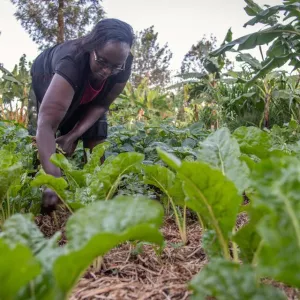Zero soil loss: towards conserving Africa’s new gold
Just before the sun sets, Anne Wangari wades through thick bunches of spinach on her plot. Nestled among the sloping hills surrounded by coffee fields in Embu County, this bumper harvest is a surprise to her. Previously, “I was planting crops in vain,” she explained. “They started withering and I didn’t understand what the problem was.” Then, she was visited

Zero soil loss: towards conserving Africa’s new gold
Just before the sun sets, Anne Wangari wades through thick bunches of spinach on her plot. Nestled among the sloping hills surrounded by coffee fields in Embu County, this bumper harvest is a surprise to her. Previously, “I was planting crops in vain,” she explained. “They started withering and I didn’t understand what the problem was.”
Then, she was visited by experts from The Alliance of Bioversity International and CIAT and the Kenya Agriculture and Livestock Research Organization (KALRO). After conducting a soil test, they explained that the threat was in her soil. More specifically, that she was losing topsoil containing critical nutrients, because the rains were washing them away.
“Once I was trained, I realized the soil had a problem,” she explains. Then, she learned techniques to prevent soil from washing away, especially considering the recent heavy rains and hilly terrain surrounding her farm, and to improve its fertility and performance. With the correct organic fertilizer, she has boosted her harvest and more than doubled her income. “There was a time I was used to farm all over, and would not even get to ten bags of maize,” she says. “Now I’ve even done half of it, and I’ve gotten seventeen bags of maize and three bags of Nyota beans.”
“Soil is gold. If you ruin the soil, it will ruin you. If you take care of it, it will take care of you.”

